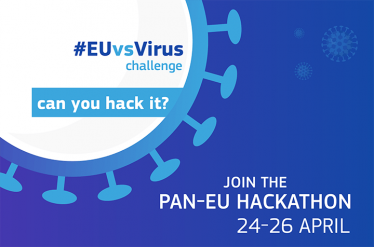“EU United Against the Virus” Hackathon

Innovators, start-ups and makers of all sorts in Europe are working to develop innovative solutions to be deployed in the short-term to alleviate the negative consequences of the corona crisis. This work complements what researchers are doing in areas such as vaccines. There are five areas that have been identified as targets for these innovative solutions: Health & Medicine, Business Continuity, Social Cohesion, Protection of Risk Groups, and Education.
We all know that hospitals and elderly residences are having problems with supplies in health material, from respirators to masks. Business continuity is also disrupting the economy in many European Member States. Students are moving into e-learning without a transition phase. All these issues need urgent short-term solutions that only innovators and startups can provide in a fast an efficient way.
Many online hackathons have been organised across Europe since the beginning of March. There have been hackathons in Estonia, Finland, Poland, Italy, Belgium, and many more are also planned to take place in the coming weeks. The largest hackathon has been the one organised in Germany on 20 March for 48 hours with 42869 participants who developed 800 projects.
#EUvsVirus - The pan European hackathon
Together with European society, the European Commission is looking for solutions to challenges related to the coronavirus. Between 24 and 26 April, the first pan-European hackathon is organised to address the very acute problem of COVID-19. The Pan-European hackathon #EUvsVirus is a joint event between the European Commission and actors from similar national initiatives from Member States on whose experiences the EU hackathon is building. It is expected a participation of 60k European citizens to #EuvsVirus hackathon.
Innovators from all industries, as well as committed citizens, are invited to take part in this important event. Participation is possible on the dedicated website https://www.euvsvirus.org/ and on Twitter at #EUvsVirus. The hackathon offers a common organizational and technical framework in which the participants can get involved online and develop working prototypes and solutions for technically, politically and socially relevant issues with regard to the corona crisis. It aims at commonly developing innovative solutions, e.g. high tech, low tech, hardware, software, etc., using biotech, digital tech, societal science and other innovation domains.
The event will be open to the European community of innovators, startups, makers, retailers, public and private buyers, end users etc. The overarching purpose of this event is to match-make and connect innovators, partners, buyers across Europe for the benefit of addressing imminent corona crisis issues (e.g. fast production of equipment, scaling up production capabilities, knowledge and solutions transfer from one country to another) and across various technological fields.
#EUvsVirus will allow for the submission of ideas and creation of teams in all EU languages. This means that there will be teams composed of individuals from several EU Member States and others where the participants will come exclusively from one MS. We do not want to miss any good idea simply because it is not in English.
EU Institutions and European organisations engagement
In addition, to the European Commission (with the EIC as leading service) other EU institutions are also interested in supporting #EUvsVirus Hackathon, notably European Parliament and the Committee of the Regions. European associations such as European Universities Association, European Clusters Association, EUTechAlliance, Medecins Sans Frontiers and others EU associations representing innovators and civil society will be also part of the partners that will support this panEU hackathon.
What after?
One of the main concerns related to the hackathons organised until now is the difficulties to follow up on the best projects stemming from the hackathon. To this aim, the pan European hackathon will provide avenues for uptake by end-users or follow-up development. The best solutions will be invited to join the European Innovation Council (EIC) Community Platform that will facilitate connections with end users (e.g. hospital) and will also provide access to investors, foundations and other funding opportunities from the EIC and other EU financial support mechanisms. It will also be a starting point of a much longer collaboration between the European Commission and the ecosystems of innovators, makers and startups across Europe in relation to the corona crisis. In addition, it will strengthen the overall ability of Europe to act together and respond to critical situations, such as the corona crisis.
Detailed information
The web site of the #EUvsVirus panEU hackathon was launched on Friday April 3rd. It includes now 27 countries (24 MSs plus 3 associated countries to H2020) in the group of National curators. The organisers of the national hackathons related to coronavirus are the partners of the European Commission on this pan European hackathon and are part of the group of National curators. In some cases, in addition to the organiser of the national hackathon the government has nominated a person to be in contact with the Commission about the daily activities related to the#EUvsVirus. The detailed list of national curators is included in Annex 1.
The ambition of #EUvsVirus is to get 60k participants in teams of 6-10 participants per team. It requires a strong IT infrastructure and a clear definition of the process. Consequently, all processes will be fully automated. The hackathon will follow a 7 phases approach: sign up, choose challenge, the hacking, solution submission, voting and follow up.
The teams will be composed of professionals from any sector of the economy and the society at large. Contrary to hackathons that are traditionally focused on IT, #EUvsVirus hackathon is positioned at the crossroad of the civil society and innovation ecosystem. It is designed as a new way of policy making and citizens engagement.

